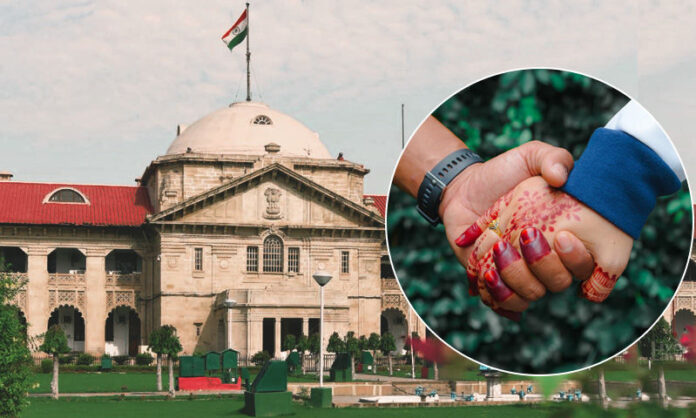The Allahabad high court has granted police protection to an interfaith couple while asserting that nobody can interfere in the peaceful life of two adults residing together out of their own free will.
A Single Bench of Justice Saral Srivastava observed, -“The Court has repeatedly held that where the two individuals having attained the age of majority, are living together, nobody is entitled to interfere in their peaceful life.”
In this case, a Hindu woman claimed that she decided to follow the Muslim religion and as such, she willingly converted her religion. After conversion, the couple submitted, she solemnized marriage with her Muslim husband.
The 22-year-old woman and her 23-year-old husband said they were adults and furnished documents reflecting that they were born in 1998 and 1997, respectively. In the writ petitions, the woman said she decided to convert to Islam on her own will and later solemnised her marriage with the man. They sought protection from their family and no interference in their married life.
“Right To Choose A Partner Of Choice A Fundamental Right”: Allahabad High Court Says The Judgments Which Held “Conversion For The Purpose Of Marriage Only” Not Good Law.
In face of these submissions, Justice Srivastava ordered the Superintendent of Police, Bijnor to provide adequate protection to an inter-faith couple, if necessary, and fixed the matter for hearing on February 8. The Court also directed the husband to deposit a sum
of Rs. 3 Lakh in favour of her wife.
“This is a free and democratic country, and once a person becomes a major he or she can marry whosoever he/she likes. If the parents of the boy or girl do not approve of such inter-caste or inter-religious marriage the maximum they can do is that they can cut
off social relations with the son or the daughter, but they cannot give threats or commit or instigate acts of violence and cannot harass the person who undergoes such intercaste or inter-religious marriage,” the bench reiterated the observations made by the Supreme Court in Lata Singh v. State of UP, 2006 CrLJ 3312.
Also read: The saga of Evictions camouflaged as ‘development’
The Court also relied on Bhagwan Dass v. State (NCT of Delhi), (2011) 6 SCC 396, where the Apex Court had made strong observations against honour killings.
“In our opinion honour killings, for whatever reason, come within the category of the rarest of rare cases deserving death punishment. It is time to stamp out these barbaric, feudal practices which are a slur on our nation. This is necessary as a deterrent for such outrageous, uncivilised behaviour. All persons who are planning to perpetrate “honour” killings should know that the gallows await them,” the Top Court had said.





























